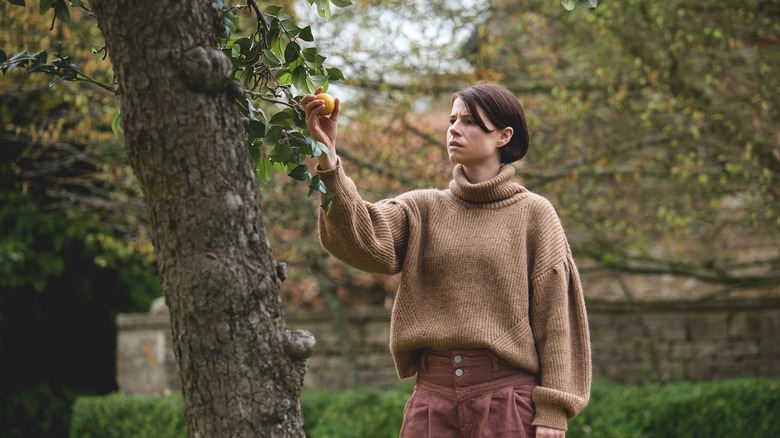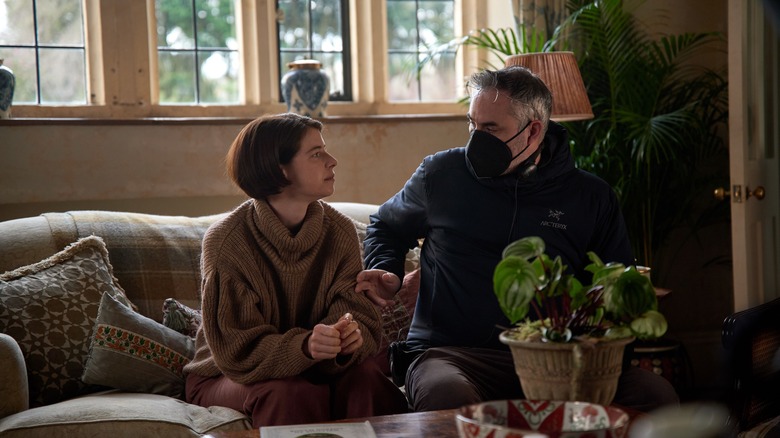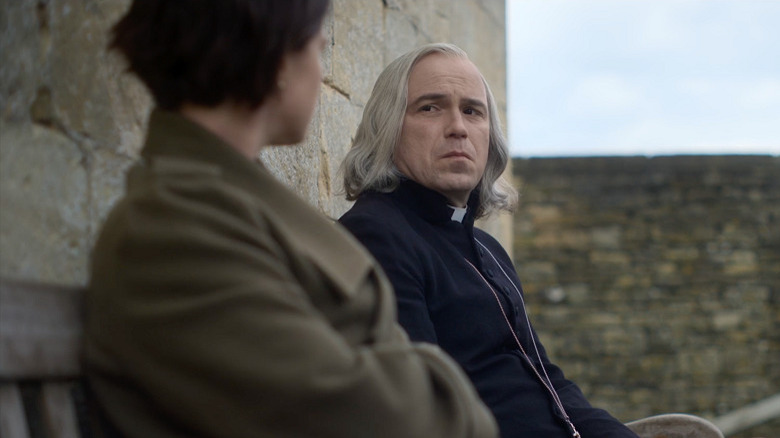Alex Garland Won't Take Full Credit For Crafting The Story Of Men
Collaboration adds extra depth and layers to the creative process, often presenting something new and exciting that otherwise wouldn't have been thought of. Alex Garland, most known for his sci-fi oriented films "Ex-Machina" and "Annihilation," has often spoken about how he finds the filmmaking process, by its very nature, to be a collaborative process. As he explained in a discussion at the National Film and Television School (NFTS), the collaboration in filmmaking is what makes the process exciting for him compared to the isolating nature of writing novels (which is how he began his career). It's that approach that has followed Garland throughout the entirety of his directorial career.
Collaboration was a vital element behind his most recently released film, "Men." A horror folktale with a focus on the age-old dynamics between men and women, "Men" follows a young woman (Jessie Buckley) taking some time to herself in the British countryside. She has rented out a manor where she intends to isolate and decompress from the traumatic death of her husband. However, upon arrival, there is a shift in dynamics between the woman and the men (all eerily played by Rory Kinnear) she encounters whilst in this remote location.
As the tension heightens and the story intensifies, Garland balances reality and the unreal in a way that helps keep things grounded for the viewer before he turns the weirdness dial up to the max. And those grounded moments can be directly attributed to his collaboration with Buckley.
'She did what you always hope for.'
Garland has never been shy about giving credit where credit is due when it comes to his collaborators. So it comes as no surprise that when discussing how the story of "Men" came to be, he pointed out how the story shaped and evolved with the influence of his cast and crew. During a chat with IndieWire, the director shared how much Buckley brought to the table when it came to influencing the story, revealing that she read the script and offered up thoughts and ideas that he wouldn't have otherwise come up with in the process of developing the story for the film. He explained further:
"As the lead actor, she ends up clearly defining stuff that is very much her own. Whilst it's a shared project, it's also her own. That doesn't just go to the interpretation of dialogue, it can extend to the dialogue itself, and also not just her own dialogue, but other people's dialogue. So there are lines that the vicar speaks that are really from Jessie. They weren't in the original script that she read."
Knowing how much Buckley contributed to the dialogue helps explain a lot. In particular, the conversation between the young woman and the vicar (a key scene) truly makes the blood boil. Both blatant and subtle, there's so much captured in that conversation that may feel all too familiar for others, and might not have been included without Buckley's input.
A team effort
Buckley wasn't the only who contributed to the development of "Men." Garland continued: "There's also shared authorship between, say, Rory Kinnear, who like me is a middle-aged man, or the DOP [Rob Hardy] or the production designer [Mark Digby], the visual effects supervisor [David Simpson]." All hands were on deck in the process because of the creative environment Garland fostered. In speaking to The Digital Fix, Buckley confirmed this in her explanation of the film's rehearsal process:
"He insisted we had a two week rehearsal period, which wasn't just to read the script, but to build a common consciousness of the world we were going to step into. And, that doesn't just lie with us the actors, that's his entire crew, who he would say are really the filmmakers, you know – the grip, the production designer, everyone was leaning into it because Alex made such a collaborative environment.[...] You come to work every single day not just wanting to, but knowing you could offer up your widest, most creative and mad ideas and they would be heard, and talked about. There wasn't anything that wouldn't be considered properly."
Having everyone involved might have led to a situation of too many cooks in the kitchen, especially given the open interpretation of the film's message. But a work environment that encourages and nourishes collaboration, and a director who gives credit where credit is due, in a rarity in this crazy world of ours. We should celebrate it.


